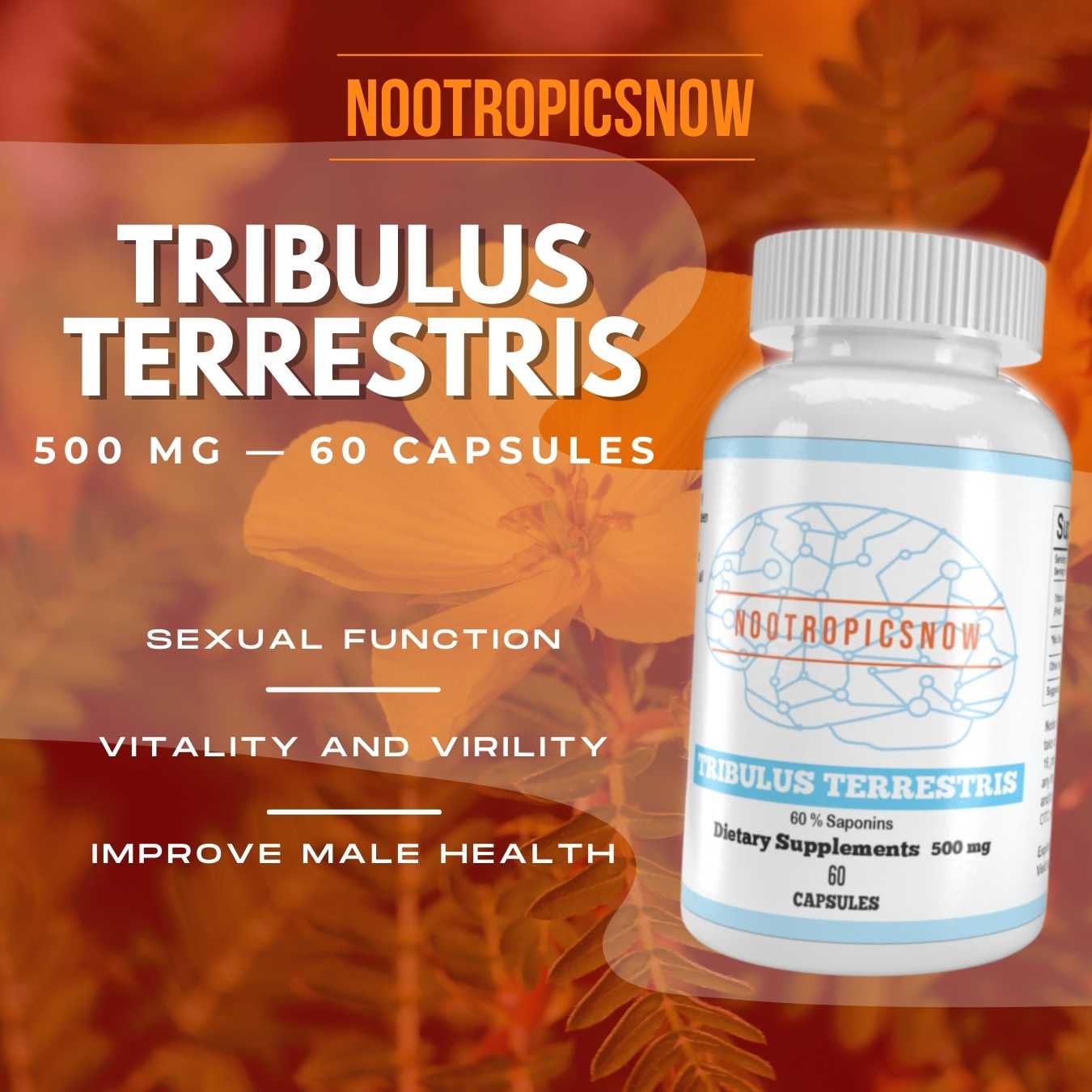Tribulus Terrestris: Benefits & Uses

Tribulus Terrestris: Benefits, Uses, and Scientific Insights
What is Tribulus Terrestris?
Tribulus terrestris, also known as puncture vine, devil’s thorn, or goat’s head, is a small leafy plant that grows in many places around the world. It thrives in dry climates and poor soil, therefore making it highly adaptable. Though often considered a weed, Tribulus terrestris has a long history of use in traditional medicine systems. Traditional Chinese Medicine (TCM) and Ayurveda have utilized it for centuries.
Historical Context
Specifically, traditional practitioners across cultures historically employed Tribulus terrestris for its perceived tonic and restorative properties. Ancient Greeks used it as a diuretic and to enhance mood, while in India, Ayurveda incorporated it to improve vitality. Similarly, TCM traditions valued it for liver and kidney support, suggesting a broad range of historical applications based on anecdotal evidence. Therefore, exploring its historical significance provides context for modern research.
Modern Uses
In modern times, Tribulus terrestris is often marketed as a dietary supplement with claimed benefits including enhancing athletic performance, improving sexual function, and supporting cardiovascular health. These claims attract athletes, bodybuilders, and individuals seeking natural health solutions.

View Product
Consequently, the supplement industry has witnessed a surge in Tribulus terrestris-based products.
Active Compounds in Tribulus Terrestris
The purported benefits of Tribulus terrestris are often attributed to its bioactive compounds. Saponins, flavonoids, and alkaloids are among the most notable.
Saponins
Saponins are glycosides that are known for their foam-forming properties and their potential to influence various physiological processes. Tribulus terrestris is particularly rich in steroidal saponins, with protodioscin being one of the most studied. Protodioscin is hypothesized to contribute to many of the plant’s claimed benefits, but more research is needed. Thus, the saponin content is an important consideration.
Flavonoids
Flavonoids are a class of plant pigments with antioxidant and anti-inflammatory properties. They help to protect cells from damage caused by free radicals. Quercetin, kaempferol, and isorhamnetin are examples of flavonoids found in Tribulus terrestris, and they contribute to its potential health-promoting effects. Further, flavonoids contribute to the overall well-being.
Alkaloids
Alkaloids are nitrogen-containing organic compounds that often have potent biological effects. Harman and harmane are alkaloids present in Tribulus terrestris. Although less emphasized than saponins and flavonoids, they are still important components. Thus, the complex interplay of these compounds contributes to Tribulus terrestris‘s effects.
Potential Health Benefits of Tribulus Terrestris
Research into Tribulus terrestris has explored its potential effects on several aspects of health. However, it’s vital to note that the evidence is mixed. More high-quality studies are needed to confirm these benefits.
Sexual Health and Libido
Tribulus terrestris is frequently promoted as a natural aphrodisiac and libido enhancer.

View Product
Some studies have suggested it may improve sexual desire in both men and women. Moreover, research indicates potential benefits for erectile dysfunction. For example, a study published in the “Journal of Ethnopharmacology” found that Tribulus terrestris extract improved sexual function in men with mild to moderate erectile dysfunction. However, other studies have yielded conflicting results, demonstrating the need for more research. In addition, individual responses vary, and therefore, further research is warranted.
Athletic Performance
Many athletes use Tribulus terrestris supplements with the expectation of increased muscle mass, strength, and endurance. This expectation comes from the belief that it can boost testosterone levels.

View Product
However, research has not consistently supported this claim. Several studies have found that Tribulus terrestris supplementation does not significantly increase testosterone levels or improve athletic performance in trained athletes. Consequently, its efficacy as a performance enhancer remains debatable. Nevertheless, athletes continue to use it, based on anecdotal evidence.
Blood Sugar Regulation
Some preliminary research suggests that Tribulus terrestris may have a beneficial effect on blood sugar levels. Studies have shown that it could potentially improve insulin sensitivity and reduce blood sugar spikes after meals. A study in the “Journal of Alternative and Complementary Medicine” found that Tribulus terrestris extract significantly reduced blood sugar levels in people with type 2 diabetes. However, these findings are preliminary, and people with diabetes should always consult their doctor before using Tribulus terrestris or any other supplement. Furthermore, it must be used under professional supervision.
Cardiovascular Health
The potential cardiovascular benefits of Tribulus terrestris are also being investigated. Some studies have indicated that it may help lower blood pressure and improve cholesterol levels. Its antioxidant properties may also protect against damage to blood vessels. A study published in the “Journal of Dietary Supplements” suggested that Tribulus terrestris extract may reduce total cholesterol and LDL (bad) cholesterol levels. Therefore, its potential cardioprotective effects warrant further investigation.
Urinary Tract Health
Traditionally, Tribulus terrestris has been used as a diuretic. Therefore, promoting urine production and relieving fluid retention. Consequently, it may help to prevent urinary tract infections and kidney stones. Nevertheless, more studies are needed to confirm these effects. Additionally, these benefits require validation through robust research.
Forms and Dosage of Tribulus Terrestris Supplements
Tribulus terrestris supplements are available in various forms, including capsules, tablets, powders, and liquid extracts. The optimal dosage can vary depending on the individual and the specific product being used.
Recommended Dosage
Generally, dosages range from 250 mg to 1500 mg per day. However, it’s essential to follow the manufacturer’s instructions and consult with a healthcare professional to determine the appropriate dosage. Start with a lower dose and gradually increase it to assess tolerance. Furthermore, individual needs influence dosage.
Considerations for Choosing a Supplement
When selecting a Tribulus terrestris supplement, consider the following:
Thus, careful selection ensures product quality.
How to Take
Tribulus terrestris supplements are usually taken with food to enhance absorption and minimize potential gastrointestinal discomfort. Consistency is essential for experiencing any potential benefits. So, adhere to a regular schedule.
Potential Side Effects and Precautions
Although generally considered safe for most people, Tribulus terrestris can cause some side effects in certain individuals. Therefore, awareness is key.
Common Side Effects
Common side effects may include:
These side effects are usually mild and temporary. However, discontinue use if they persist.
Precautions
Consult with a healthcare provider before using Tribulus terrestris, especially if you have any pre-existing medical conditions or are taking medications. Similarly, professional guidance is vital.
Scientific Evidence: What Does the Research Say?
The scientific evidence surrounding Tribulus terrestris is varied, with some studies showing promising results and others finding no significant effects. The quality of research also varies, highlighting the need for more rigorous and well-designed trials.
Studies on Sexual Function
Several studies have investigated the effects of Tribulus terrestris on sexual function. A meta-analysis published in the “Journal of Sexual Medicine” examined multiple studies and concluded that Tribulus terrestris may have a modest positive effect on libido in both men and women. However, the authors noted that the quality of the evidence was low and that more research is needed to confirm these findings.
Studies on Athletic Performance
The research on Tribulus terrestris and athletic performance has been largely disappointing. A systematic review published in the “Journal of Strength and Conditioning Research” analyzed several studies and found no evidence that Tribulus terrestris supplementation improves muscle strength or body composition in athletes.
Studies on Blood Sugar and Cardiovascular Health
Some studies have shown that Tribulus terrestris may have a positive effect on blood sugar and cholesterol levels. However, the evidence is still limited, and more research is needed to confirm these effects. These findings should be interpreted with caution.
Quality of Research
It’s crucial to consider the quality of the research when evaluating the potential benefits of Tribulus terrestris. Many studies have been small, poorly designed, or lacked proper controls. Therefore, the results should be interpreted with caution. Larger, well-designed, placebo-controlled trials are needed to provide more definitive evidence. Also, these trials should adhere to strict methodologies.
Tribulus Terrestris in Traditional Medicine Systems
Despite the mixed scientific evidence, Tribulus terrestris remains a significant herb in traditional medicine systems. Its long history of use suggests that it may offer certain benefits, even if these are not fully understood by modern science.
Ayurveda
In Ayurveda, Tribulus terrestris is known as Gokshura and is considered a rasayana, or rejuvenative herb. It is used to support kidney function, improve urinary health, and enhance vitality. Ayurvedic practitioners often combine it with other herbs to create synergistic formulations. Similarly, complex formulations enhance effectiveness.
Traditional Chinese Medicine (TCM)
In TCM, Tribulus terrestris is known as Bai Ji Li and is used to invigorate the blood, promote liver health, and treat eye disorders. TCM practitioners believe that it can help to clear heat and stagnation from the body. Further, TCM employs holistic approaches.
Other Traditional Uses
Across different cultures, Tribulus terrestris has been used to treat a variety of ailments, including skin conditions, digestive problems, and inflammatory disorders. These traditional uses highlight its diverse range of applications. Additionally, traditional uses inform modern research.
The Future of Tribulus Terrestris Research
As interest in natural health solutions continues to grow, research into Tribulus terrestris is likely to expand. Future studies should focus on:
These efforts will help to clarify its role in health and wellness.
Potential Applications
Future research may uncover new applications for Tribulus terrestris. Its potential antioxidant, anti-inflammatory, and adaptogenic properties suggest that it could be useful for a wide range of conditions. Moreover, exploring its mechanisms of action is crucial.
Combining with Other Herbs
Exploring the synergistic effects of Tribulus terrestris when combined with other herbs could also yield promising results. This approach aligns with the principles of traditional medicine systems, which often use herbal combinations to enhance therapeutic effects. Hence, herbal combinations deserve further study.
Conclusion
Tribulus terrestris is a versatile plant with a rich history and a growing body of scientific research. While some of its claimed benefits remain unproven, it shows promise for improving sexual function, regulating blood sugar, and supporting cardiovascular health. As with any supplement, it’s crucial to use Tribulus terrestris responsibly and consult with a healthcare professional before use. Future research will hopefully provide more definitive answers about its potential benefits and applications. Nevertheless, responsible use is paramount.
Tribulus Terrestris: Unveiling the Potential of This Ancient Herb
Tribulus Terrestris, also known as puncture vine, goat’s head, or Gokshura (in Ayurveda), is a plant that has garnered significant attention for its potential health benefits. It grows in many places around the world, including parts of Europe, Asia, Africa, and Australia. This herb has a rich history in traditional medicine systems. It has long been used for a variety of health-related reasons. However, the modern research exploring its efficacy continues.
A Deep Dive into the Botanical Profile
Tribulus Terrestris belongs to the Zygophyllaceae family. The plant itself is a relatively small, leafy plant. Characteristically, it grows prostrate along the ground. The leaves are pinnately compound, creating a feathery appearance. Bright yellow flowers bloom during the warmer months and give way to distinctive spiny fruits. These fruits, indeed, are responsible for the plant’s common name, puncture vine. The sharp spines can easily puncture tires and cause discomfort when stepped on.
Traditional Applications Across Cultures
Across many different cultures, traditional medicine has utilized Tribulus Terrestris for centuries.
Bioactive Compounds and Their Potential
Tribulus Terrestris contains a variety of bioactive compounds that may be responsible for its purported health benefits. The key components include:
Health Benefits: What Does the Research Say?
While Tribulus Terrestris has a long history of traditional use, modern research is investigating its potential health benefits. Some studies suggest the following:
1. Sexual Function and Libido
One of the most popular uses of Tribulus Terrestris is its potential to enhance sexual function and libido. Some studies suggest that it may improve sexual desire, arousal, and satisfaction in both men and women. Moreover, this herb may have promising effects in people with diminished libido. However, it’s essential to note that some studies haven’t found significant effects on testosterone levels. Therefore, more extensive, well-designed research is necessary to validate these claims.

View Product

View Product
2. Athletic Performance
Tribulus Terrestris is often marketed as a supplement to enhance athletic performance, increase muscle mass, and boost strength. Research in this area has yielded mixed results. While some studies show no significant effect on muscle strength or body composition, others have indicated potential benefits in certain populations. For example, some athletes report increased power output and reduced muscle fatigue. More studies are warranted to explore the influence of Tribulus Terrestris on athletic capabilities.
3. Cardiovascular Health
Some studies suggest that Tribulus Terrestris may have cardiovascular benefits. Its antioxidant and anti-inflammatory properties may help protect against heart disease by improving blood vessel function and reducing oxidative stress. Preliminary research indicates that it may lower blood pressure and cholesterol levels in some individuals, but further investigation is needed to confirm these effects and determine the appropriate dosage.
4. Blood Sugar Regulation
Preliminary research suggests that Tribulus Terrestris may play a role in regulating blood sugar levels, making it a potential aid for individuals with diabetes or insulin resistance. Animal studies have demonstrated that Tribulus Terrestris extract may improve insulin sensitivity and reduce blood glucose levels. Still, human studies are needed to determine its effectiveness and safety for managing blood sugar.
5. Urinary Tract Health
Traditionally, Tribulus Terrestris has been used as a diuretic to promote urinary flow and support kidney function. Some studies have shown that it may help prevent the formation of kidney stones and alleviate symptoms of urinary tract infections (UTIs). Its diuretic properties can help flush out toxins and excess fluids from the body, which is beneficial for overall urinary health.
6. Antioxidant and Anti-Inflammatory Properties
Tribulus Terrestris is rich in antioxidant and anti-inflammatory compounds, such as flavonoids and saponins, which can help protect the body against oxidative stress and inflammation. Oxidative stress and chronic inflammation are implicated in various diseases, including heart disease, cancer, and neurodegenerative disorders.
Dosage and Safety Considerations
When considering the use of Tribulus Terrestris as a supplement, it’s essential to be aware of appropriate dosage and safety considerations. The optimal dosage may vary depending on individual factors, such as age, health status, and the specific product being used. It’s best to follow the manufacturer’s instructions on the product label or consult with a healthcare professional for personalized advice.
Possible Side Effects
While Tribulus Terrestris is generally considered safe for most people, some individuals may experience side effects. These can include:
Choosing a High-Quality Supplement
If you decide to use Tribulus Terrestris as a supplement, choosing a high-quality product from a reputable manufacturer is vital. Here are some factors to consider:
Combining Tribulus Terrestris with Other Supplements
Some individuals consider combining Tribulus Terrestris with other supplements to enhance its effects or address specific health concerns. While some combinations may be safe and beneficial, others may pose risks or interactions. Here are some examples:
It’s always best to consult with a healthcare professional before combining Tribulus Terrestris with other supplements. This is to ensure safety and avoid potential interactions.
Concluding Thoughts: Is Tribulus Terrestris Right for You?
Tribulus Terrestris is a herb with a rich history in traditional medicine and a growing body of scientific research exploring its potential health benefits. While it’s often touted for its ability to enhance sexual function, athletic performance, and cardiovascular health, more extensive studies are needed to confirm these claims.
If you are considering using Tribulus Terrestris as a supplement, it’s crucial to weigh the potential benefits and risks, consider your individual health needs and consult with a healthcare professional for personalized advice.
By staying informed and making wise choices, you can make the most of Tribulus Terrestris while keeping your overall health and safety a top priority.

